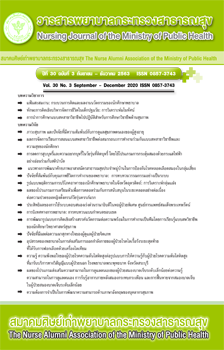Needs in English Competency Development of Health Personnel
Main Article Content
Abstract
The purpose of this descriptive research was to study the needs and problems of English competency development of health personnel. The sample consisted of 217 health personnel working in 13 health regions. Data were collected before attending English training courses for practice. The research instruments consisted of a general information check list, and skills and needs for English competency development questionnaires. The statistics used for data analysis were frequency, percentage, mean, standard deviation, modified priority needs index (PNImodified), and content analysis. The results of the study showed that the sample assessed the authenticity of their overall English competency at a moderate level (=2.47, SD=.67), and the expectation of their English competency at a high level (
=3.77, SD=2.35). The PNImodified of the needs for English competency development was .52. Analyzing each aspect of the needs for English competency development, it was revealed that the health personnel needed to develop reading skill as the first priority (PNImodified .60) and listening skill as the last (PNImodified .40). Problems and obstacles in the development of English competency of health personnel included little practical use of English due to lack of opportunity, lack of self-confidence, and lack of opportunity for development. Therefore, health regions and the Ministry of Public Health should stipulate the development of English competency as the main policy for health workforce development. In addition, health service settings should continuously promote the development of English competency and the utilization by health personnel.
Article Details
บทความและรายงานวิจัยในวารสารพยาบาลกระทรวงสาธารณสุข เป็นความคิดเห็นของ ผู้เขียน มิใช่ของคณะผู้จัดทำ และมิใช่ความรับผิดชอบของสมาคมศิษย์เก่าพยาบาลกระทรวงสาธารณสุข ซึ่งสามารถนำไปอ้างอิงได้
References
2. Association of Southeast Asian Nations. The ASEAN charter. [internet].2017 [cited 2017 July 8]. Available from: https://asean.org/storage/2017/07/8.-July-2017-The-ASEAN-Charter-21th-Reprint-with-Updated-Annex-1.pdf
3. Yimon Y. The use of English in the careers of Thai graduates in Bangkok. Panyapiwat Journal.2014; 5(2):191-204. (in Thai).
4. Sungkabool P, Srathonghon S, Muangwong T, Kummuang A. Annual report following the policy to develop Thailand to be medical hub. Nonthaburi: International Health Division, Department of Health Service Support, Ministry of Public Health;2016. (in Thai).
5. Yomyao A. The Essential English Skills Using Problem for Professional Nurses Working in the Medium and the Large Hospitals in Chiang Rai Province. Apheit Journals.2017;23(2):56-66. (in Thai).
6. Woragittanont I, Suraratdecha S. Needs Analysis of Studying English for Medical Students in a Universitywith the Aim of ASEAN Economic Community (AEC). Journal of Graduate Study in Humanities and Social Sciences.2016;5(1):138-69. (in Thai).
7. Ritthirat N. Thai University student’s English oral proficiency and problems to developing English speaking skill. [Thesis]. Songkla: Prince of Songkla University;2014. (in Thai).
8. Ellis M, Johnson C. Teaching business English. Oxford: Oxford University Press; 2009.
9. Soonthorn S, Turner K, von Bormann S, Wichaikull S, Khamwong W, Ritruechai S. Knowledge, attitude and essential skills in English of healthcare personnel in 13 health service regions under the supervision of the ministry of public health, Thailand. Journal of The Police Nurses.2019;11(2):453-63. (in Thai).
10. Sillapee T. The English speaking development for civil engineers: A case study in a private construction company. The 3rd national conference& research presentation 2016. 17th June 2016; Muang, Nakhonratchasima :Nakhonratchasima College; p.243-51. (in Thai).
11. Pongpanich N. A study of problems in English speaking in speech communication of management sciences students, Kasetsart University, Sriracha Campus: October 2007 to September 2008. Humanities Journal.2011;18(1):85-97. (in Thai).
12. Puvitayaphan A. Strategic talent management and development. 2nd ed. Bangkok: Pimdeekarnpim; 2015. (in Thai).
13. Chomchaiya C. Factors affecting English communication ability in daily life of graduates from Thai higher education institutions who were working in Bangkok. Suan Dusit Graduate School Academic Journal. 2016;12(2):167-84. (in Thai).
14. University of the Thai Chamber of Commerce. Use of English in daily life [Internet].2015 [cited 2015 July 20]; Available from: http:// www.elearning 2.utcc.ac.th.e>content. (in Thai).
15. Chatsakul C, Siritarungsri B, Tangkittithaworn S, Chotpitayasunon C. Development of a preparation program for knowledge, attitude, and skills for ASEAN community of nurses in Chonpratan Hospital. Journal of Nursing, Siam University.2017;18(34):71-88. (in Thai).
16. Wutwongsa N. Motivational strategies: Enhancing English language skills. Executive Journal.2014;34(1):89-97. (in Thai).

